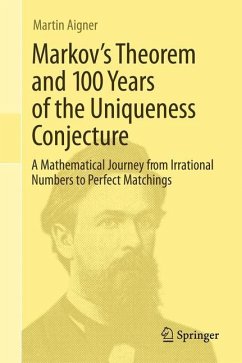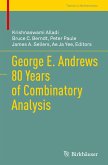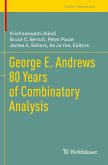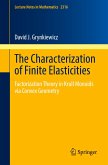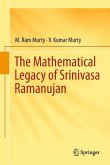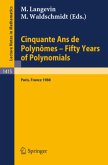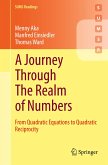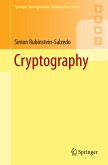This book takes the reader on a mathematical journey, from a number-theoretic point of view, to the realm of Markov's theorem and the uniqueness conjecture, gradually unfolding many beautiful connections until everything falls into place in the proof of Markov's theorem. What makes the Markov theme so attractive is that it appears in an astounding variety of different fields, from number theory to combinatorics, from classical groups and geometry to the world of graphs and words.
On the way, there are also introductory forays into some fascinating topics that do not belong to the standard curriculum, such as Farey fractions, modular and free groups, hyperbolic planes, and algebraic words. The book closes with a discussion of the current state of knowledge about the uniqueness conjecture, which remains an open challenge to this day.
All the material should be accessible to upper-level undergraduates with some background in number theory, and anything beyond this level isfully explained in the text.
This is not a monograph in the usual sense concentrating on a specific topic. Instead, it narrates in five parts - Numbers, Trees, Groups, Words, Finale - the story of a discovery in one field and its many manifestations in others, as a tribute to a great mathematical achievement and as an intellectual pleasure, contemplating the marvellous unity of all mathematics.
On the way, there are also introductory forays into some fascinating topics that do not belong to the standard curriculum, such as Farey fractions, modular and free groups, hyperbolic planes, and algebraic words. The book closes with a discussion of the current state of knowledge about the uniqueness conjecture, which remains an open challenge to this day.
All the material should be accessible to upper-level undergraduates with some background in number theory, and anything beyond this level isfully explained in the text.
This is not a monograph in the usual sense concentrating on a specific topic. Instead, it narrates in five parts - Numbers, Trees, Groups, Words, Finale - the story of a discovery in one field and its many manifestations in others, as a tribute to a great mathematical achievement and as an intellectual pleasure, contemplating the marvellous unity of all mathematics.
From the reviews:
"This beautiful book gives readers a chance to familiarize themselves with a very simple and yet very difficult problem in number theory, and teaches them that it pays to look at a problem from many different angles. I recommend it to all students who are already hooked to number theory, and perhaps even more to those who are not." -- (Franz Lemmermeyer, zbMATH, Vol. 1276, 2014)
"This beautiful book gives readers a chance to familiarize themselves with a very simple and yet very difficult problem in number theory, and teaches them that it pays to look at a problem from many different angles. I recommend it to all students who are already hooked to number theory, and perhaps even more to those who are not." -- (Franz Lemmermeyer, zbMATH, Vol. 1276, 2014)
From the book reviews:
"The topic, and its presentation, does make it a fine source for seminar usage. ... this is a fine text for students who are ready to see material connecting various areas of mathematics. It reveals the beauty and hints at the excitement of 'live' mathematics." (Thomas A. Schmidt, Mathematical Reviews, September, 2014)
"In number theory, Markov's theorem (1879) reveals surprising structure within a set of real numbers, called the Lagrange spectrum, which collects precise information about approximability of irrational numbers. ... Summing Up: Highly recommended. Upper-division undergraduates and above." (D. V. Feldman, Choice, Vol. 51 (8), April, 2014)
"Book tells the story of a celebrated theorem and an intriguing conjecture: Markov's theorem from 1879 and the uniqueness conjecture formulated by Frobenius ... . author takes the opportunity to look at this theorem and this conjecture from many different viewpoints ... . He offers a journey through the mathematical world around Markov's theorem in a leisurely and relaxed style, making his book very pleasant to read. ... An undergraduate student will certainly enjoy this reading and learn a lot." (Yann Bugeaud, Jahresbericht der Deutschen Mathematiker-Vereinigung, Vol. 116, 2014)
"This beautiful book gives readers a chance to familiarize themselves with a very simple and yet very difficult problem in number theory, and teaches them that it pays to look at a problem from many different angles. I recommend it to all students who are already hooked to number theory, and perhaps even more to those who are not." (Franz Lemmermeyer, zbMATH, Vol. 1276, 2014)
"The topic, and its presentation, does make it a fine source for seminar usage. ... this is a fine text for students who are ready to see material connecting various areas of mathematics. It reveals the beauty and hints at the excitement of 'live' mathematics." (Thomas A. Schmidt, Mathematical Reviews, September, 2014)
"In number theory, Markov's theorem (1879) reveals surprising structure within a set of real numbers, called the Lagrange spectrum, which collects precise information about approximability of irrational numbers. ... Summing Up: Highly recommended. Upper-division undergraduates and above." (D. V. Feldman, Choice, Vol. 51 (8), April, 2014)
"Book tells the story of a celebrated theorem and an intriguing conjecture: Markov's theorem from 1879 and the uniqueness conjecture formulated by Frobenius ... . author takes the opportunity to look at this theorem and this conjecture from many different viewpoints ... . He offers a journey through the mathematical world around Markov's theorem in a leisurely and relaxed style, making his book very pleasant to read. ... An undergraduate student will certainly enjoy this reading and learn a lot." (Yann Bugeaud, Jahresbericht der Deutschen Mathematiker-Vereinigung, Vol. 116, 2014)
"This beautiful book gives readers a chance to familiarize themselves with a very simple and yet very difficult problem in number theory, and teaches them that it pays to look at a problem from many different angles. I recommend it to all students who are already hooked to number theory, and perhaps even more to those who are not." (Franz Lemmermeyer, zbMATH, Vol. 1276, 2014)

